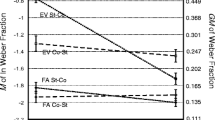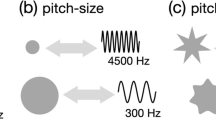Abstract
Some classical studies on temporal order judgments (TOJ) suggested a single central process comparing stimulus onsets across modalities. The prevalent current view suggests that there is modality-specific timing estimation followed by a cross-modal stage. If the latter view is correct, TOJ’s may vary depending on stimulus modality. Further, if TOJ is based only on onsets, stimulus duration should be irrelevant. To address these issues, we used both unisensory and multisensory stimuli to test whether unisensory duration processing influences cross-modal TOJ’s. The stimuli were auditory noise bursts, visual squares, and their cross-modal combinations presented at 10, 40 and 500 ms durations, and various stimulus onset asynchronies. Psychometric functions were measured with an identical task in all conditions: On each trial, two stimuli were presented, one to the left, the other to the right of fixation. The participants judged which one started first. TOJ’s were little affected by stimulus duration, implying that they are mainly determined by stimulus onsets. Throughout, the cross-modal just noticeable differences were larger than the unisensory ones. In accordance with the current view, our results suggest that cross-modal TOJ’s require a comparison of timing after modality-specific estimations.





Similar content being viewed by others
References
Alais D, Cass J (2010) Multisensory perceptual learning of temporal order: audiovisual learning transfers to vision but not audition. PLoS One 5(6):e11283. https://doi.org/10.1371/journal.pone.0011283
Babkoff H, Fostick L (2013) The role of tone duration in dichotic temporal order judgment. Atten Percept Psychophys 75(4):654–660. https://doi.org/10.3758/s13414-013-0449-6
Bernasconi F, Manuel AL, Murray MM, Spierer L (2011) Pre-stimulus beta oscillations within left posterior sylvian regions impact auditory temporal order judgment accuracy. Int J Psychophysiol 79(2):244–248. https://doi.org/10.1016/j.ijpsycho.2010.10.017
Boenke LT, Deliano M, Ohl FW (2009) Stimulus duration influences perceived simultaneity in audiovisual temporal-order judgment. Exp Brain Res 198(2–3):233–244. https://doi.org/10.1007/s00221-009-1917-z
Borucki E, Berg BG (2017) Isolating spectral cues in amplitude and quasi-frequency modulation discrimination by reducing stimulus duration. Hear Res 348:129–133
Brainard DH (1997) The psychophysics toolbox. Spat Vis 10:433–436
Bueti D (2011) The sensory representation of time. Front Integr Neurosci 5:34. https://doi.org/10.3389/fnint.2011.00034
Eg R, Behne DM (2015) Perceived synchrony for realistic and dynamic audiovisual events. Front Psychol 6:736. https://doi.org/10.3389/fpsyg.2015.00736
Fujisaki W, Nishida S (2005) Temporal frequency characteristics of synchrony-asynchrony discrimination of audio-visual signals. Exp Brain Res 166(3–4):455–464. https://doi.org/10.1007/s00221-005-2385-8
Fujisaki W, Nishida S (2010) A common perceptual temporal limit of binding synchronous inputs across different sensory attributes and modalities. Proc Biol Sci 277(1692):2281–2290. https://doi.org/10.1098/rspb.2010.0243
Fujisaki W, Kitazawa S, Nishida S (2012) Multisensory timing. In: Stein BE (ed) The new handbook of multisensory processing. MIT Press, Cambridge, MA
Grabot L, van Wassenhove V (2017) Time order as psychological bias. Psychol Sci 28(5):670–678
Grondin S (2010) Timing and time perception: a review of recent behavioral and neuroscience findings and theoretical directions. Atten Percept Psychophys, 72(3), 561–582. https://doi.org/10.3758/APP.72.3.561
Grondin S (2014) Why studying intermodal duration discrimination matters. Frontiers in Psychology. https://doi.org/10.3389/fpsyg.2014.00628
Hirsh IJ, Sherrick CE Jr (1961) Perceived order in different sense modalities. J Exp Psychol 62:423–432
Jaśkowski P (1991) Perceived onset simultaneity of stimuli with unequal durations. Perception 20(6):715–726
Jaśkowski P (1992) Temporal-order judgment and reaction time for short and long stimuli. Psychol Res 54:141–145
Jaśkowski P (1993) Temporal-order judgment and reaction time to stimuli of different rise times. Perception 22(8):963–970
Kleiner M, Brainard DH, Pelli DG (2007). What’s new in Psychtoolbox-3. Perception ECVP abstract supplement, 36
Kösem A, Gramfort A, van Wassenhove V (2014) Encoding of event timing in the phase of neural oscillations. Neuroimage 92:274–284. https://doi.org/10.1016/j.neuroimage.2014.02.010
Krueger Fister J, Stevenson RA, Nidiffer AR, Barnett ZP, Wallace MT (2016) Stimulus intensity modulates multisensory temporal processing. Neuropsychologia 88:92–100. https://doi.org/10.1016/j.neuropsychologia.2016.02.016
Kuling IA, van Eijk RL, Juola JF, Kohlrausch A (2012) Effects of stimulus duration on audio-visual synchrony perception. Exp Brain Res 221(4):403–412. https://doi.org/10.1007/s00221-012-3182-9
Merchant H, Zarco W, Prado L (2008). Do we have a common mechanism for measuring time in the hundreds of millisecond range? Evidence from multiple-interval timing tasks. J Neurophysiol 99(2):939–949. https://doi.org/10.1152/jn.01225.2007
Mollon JD, Perkins AJ (1996) Errors of judgement at Greenwich in 1796. Nature 380(6570):101–102. https://doi.org/10.1038/380101a0
Patterson RD, Nimmo-Smith I, Weber DL, Milroy R (1982) The deterioration of hearing with age: frequency selectivity, the critical ratio, the audiogram, and speech threshold. J Acoust Soc Am 72:1788–1803
Pelli DG (1997) The VideoToolbox software for visual psychophysics: transforming numbers into movies. Spat Vis 10:437–442
Penney TB, Gibbon J, Meck WH (2000) Differential effects of auditory and visual signals on clock speed and temporal memory. J Exp Psychol Hum Percept Perform 26(6):1770–1787
Salmela V, Laurinen PI (2009) Low-level features determine brightness in White’s and Benary’s illusions. Vision Res 49:682–690
Schimmel O, Kohlrausch A (2008) On the influence of interaural differences on temporal perception of noise bursts of different durations. J Acoust Soc Am 123(2):986–997. https://doi.org/10.1121/1.2821979
Shi Z, Church RM, Meck WH (2013) Bayesian optimization of time perception. Trends Cogn Sci 17(11):556–564
Spence C, Shore DI, Klein RM (2001) Multisensory prior entry. J Exp Psychol Gen 130(4):799–832
Sternberg S, Knoll RL (1973) The perception of temporal order: Fundamental issues and a general model. In: Kornblum S (ed) Attention and performance IV. Academic Press, New York, pp 629–685
Stevenson RA, Zemtsov RK, Wallace MT (2012) Individual differences in the multisensory temporal binding window predict susceptibility to audiovisual illusions. J Exp Psychol Hum Percept Perform 38(6):1517–1529
Tiippana K, Näsänen R, Rovamo J (1994) Contrast matching of two-dimensional compound gratings. Vision Res 34:1157–1163
van Wassenhove V (2009) Minding time in an amodal representational space. Philos Trans R Soc Lond B Biol Sci 364(1525):1815–1830. https://doi.org/10.1098/rstb.2009.0023
Vatakis A, Spence C (2010). Audiovisual temporal integration for complex speech, object-action, animal call, and musical stimuli. In: Naumer MJ, Kaiser J (eds), Multisensory object perception int he primate brain: Springer, New York
Virsu V, Oksanen-Hennah H, Vedenpää A, Jaatinen P, Lahti-Nuuttila P (2008) Simultaneity learning in vision, audition, tactile sense and their cross-modal combinations. Exp Brain Res 186(4):525–537. https://doi.org/10.1007/s00221-007-1254-z
Vroomen J, Keetels M (2010). Perception of intersensory synchrony: a tutorial review. Atten Percept Psychophys 72(4):871–884. https://doi.org/10.3758/APP.72.4.871
Wichmann F, Hill N (2001) The psychometric function: I. fitting, sampling, and goodness of fit. Perception Psychophysics 63(8):1293–1313
Zampini M, Shore DI, Spence C (2003) Audiovisual temporal order judgments. Exp Brain Res 152(2):198–210. https://doi.org/10.1007/s00221-003-1536-z
Author information
Authors and Affiliations
Corresponding author
Ethics declarations
Ethical approval
All procedures performed in studies involving human participants were in accordance with the ethical standards of the institutional and/or national research committee and with the 1964 Helsinki declaration and its later amendments or comparable ethical standards.
Conflict of interest
The authors declare that they have no conflict of interest.
Rights and permissions
About this article
Cite this article
Tiippana, K., Salmela, V.R. Stimulus duration has little effect on auditory, visual and audiovisual temporal order judgement. Exp Brain Res 236, 1273–1282 (2018). https://doi.org/10.1007/s00221-018-5218-2
Received:
Accepted:
Published:
Issue Date:
DOI: https://doi.org/10.1007/s00221-018-5218-2




